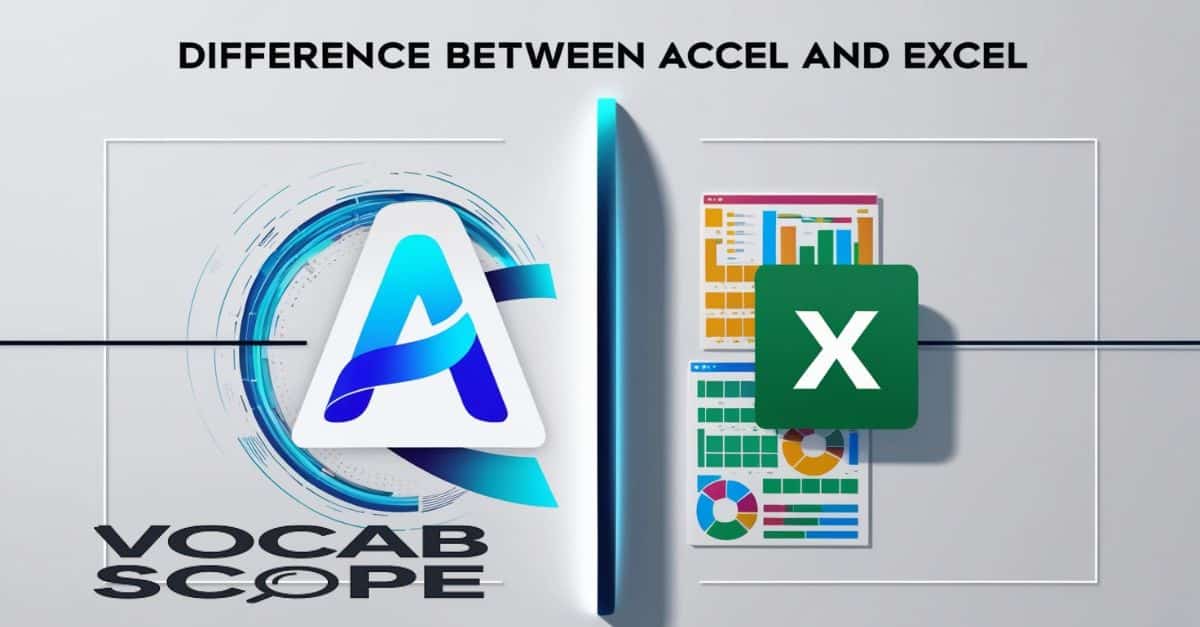Ever found yourself scratching your head, wondering whether to use “accel” or “excel” in a sentence? You’re not alone. These words, while similar in sound, couldn’t be more different in meaning.
Let’s dive into the nitty-gritty of these often-confused terms and explore their unique applications in various contexts. Understanding when to use each can save you from a potential grammar blunder!
Defining the Terms
First things first, let’s break down what each word actually means.
Accel: This term is short for “accelerate,” which means to increase speed or velocity. It’s about moving faster, quickening the pace, or speeding up a process.
Excel: On the other hand, “excel” means to surpass others or be superior in performance. It’s about standing out, achieving greatness, or showing exceptional skill.
What Does “Accel” Mean?

“Accel” is an abbreviation for the verb accelerate, which means to quicken speed, increase velocity, or move at a faster rate.
The word is often used in contexts where speed and movement are involved, whether in business growth, technical advancements, or simply a vehicle accelerating on the highway.
Synonyms for “Accel”
- Speed up
- Boost speed
- Quicken
- Hasten
- Increase velocity
You Will Like: totalling-or-totaling-which-spelling-to-use
What Does “Excel” Mean?

On the other hand, “Excel” means to perform exceptionally well in a task or area. It’s commonly associated with outstanding performance and academic achievement, often indicating someone has surpassed expectations or demonstrated superior skills.
In the business world, excelling often refers to achieving exceptional results and showing great leadership skills.
Synonyms for “Excel”
- Outperform
- Surpass
- Shine
- Stand out
- Exceed
Accel vs. Excel: A Comparative Look
To better understand the distinction, let’s compare these terms side by side:
| Accel | Excel |
| Refers to speed | Refers to performance |
| Often used in physical contexts | Used in achievement contexts |
| Implies movement or progress | Implies superiority or distinction |
| Related to velocity | Related to quality or skill |
| Used in scientific or technical fields | Used in academic, professional, or personal contexts |
Common Confusions and How to Avoid Them
The confusion between “accel” and “excel” often arises in contexts where both speed and performance are relevant. For instance, in a business setting, you might hear someone say, “We need to accel our project to excel in the market.” Here’s how to keep them straight:
- Think of “accel” as the gas pedal in your car. It’s all about speeding things up.
- Think of “excel” as reaching the top of the class. It’s about being the best.
Read More: Cacoon or Cocoon: Which Spelling is Correct?
Understanding the Difference Between Accel and Excel
Here’s a quick comparison to clarify the difference:

| Aspect | Accel | Excel |
| Definition | To increase speed or move faster | To achieve high performance or do better than others |
| Synonyms | Speed up, quicken, increase velocity | Outperform, surpass, stand out |
| Context | Speed, movement, progression | Success, achievement, superior performance |
| Examples | Cars accel on highways, businesses accel in growth | Students excel in academics, athletes excel in sports |
Example in Context
“Accel”
Now, let’s explore how “accel” is used in various scenarios:
- Technology: In the world of technological progress, engineers often work to accel the processing speed of computers.
- Sports: Race car drivers constantly seek ways to increase velocity and accel their vehicles on the track.
- Business: Business leaders look for strategies to accel the growth of their companies in competitive markets.
- Science: Scientists in laboratories accel chemical reactions to study their properties more efficiently.
- Emergency: To improve communication in emergencies, first responders accel their response times through rigorous training.
- Farming: In the realm of sustainable farming, some techniques accel plant growth without compromising quality.
- Gaming: Video game developers accel loading times to enhance user experience.
- Urban: Urban planners design systems to accel public transportation, reducing congestion in cities.
- Medicine: In the field of medicine, researchers work tirelessly to accel the development of new treatments.
- Athletics: Athletes train rigorously to accel their recovery time between intense workouts.
“Excel”
Now, let’s turn our attention to how “excel” is used:
- Academic: Students who excel in their studies often achieve high levels of academic achievement.
- Leadership: In the corporate world, exceptional leaders excel at motivating their teams and driving innovation.
- Art: Artists who excel in their craft often push the boundaries of creativity and expression.
- Software: Many professionals use Microsoft Excel, a popular spreadsheet program, to excel at data analysis and financial modeling.
- Language: In the field of language acquisition, some individuals excel at picking up new dialects and accents.
- Sports: Athletes who excel in their sports often demonstrate outstanding performance on and off the field.
- Culinary: Chefs who excel in the culinary arts create dishes that tantalize taste buds and push gastronomic boundaries.
- Customer: Companies that excel in customer service often see significant business growth as a result.
- Science: Scientists who excel in their research contribute to groundbreaking technical advancement in their fields.
- Problem–solving: Individuals with excellent problem-solving skills often excel in high-pressure situations.
Real-World Applications
Understanding the difference between “accel” and “excel” can have practical implications in various fields:
In business growth, companies might need to accel their production to meet demand, while simultaneously striving to excel in product quality.
For academic achievement, students may need to accel their study pace to cover all material, but the goal is to excel in understanding and application.
In sports, athletes work to accel their physical capabilities through training, aiming to excel in competitions.
The Impact of Language Precision
Being precise in our language use isn’t just about avoiding embarrassing mistakes; it’s about effective communication. When we use words correctly, we:
- Convey our ideas more clearly
- Demonstrate outstanding performance in verbal and written communication
- Improve communication in professional and personal settings
- Enhance our credibility and authority on subjects
Key Differences and Real-Life Examples
In the Microsoft Excel environment, the term excel refers to success or mastery over a task, whether it’s data analysis, building a spreadsheet, or producing charts.
For example, a business analyst might excel in tasks related to complex spreadsheet software. They might also use Excel applications to track and improve business growth or commercial expansion.
On the other hand, accel fits more naturally in scenarios related to technical advancements or physical speed.
For instance, a company launching a new product may need to accelerate motion to meet market demand or keep up with competitors’ cutting-edge technology.
Similarly, engineers working in innovation may develop vehicles designed to boost speed and increase velocity.
Final Thoughts:
In a world where communication skills are increasingly vital, understanding the nuances between words like “accel” and “excel” can make a significant difference.
Whether you’re writing a business report, crafting an academic paper, or simply trying to express yourself clearly, knowing when to use each term will help you communicate more effectively.
Remember, language is a tool for precision. By using “accel” when you mean to speed something up, and “excel” when you’re talking about outstanding achievement, you’re not just using words correctly – you’re excelling at communication itself.

“Robert Henry is an experienced blogger with a passion for language and education. His insightful posts on Vocab Scope offer readers valuable tips on vocabulary and grammar. With a background in linguistics and a knack for clear, engaging writing, Robert is dedicated to helping others enhance their communication skills.”






